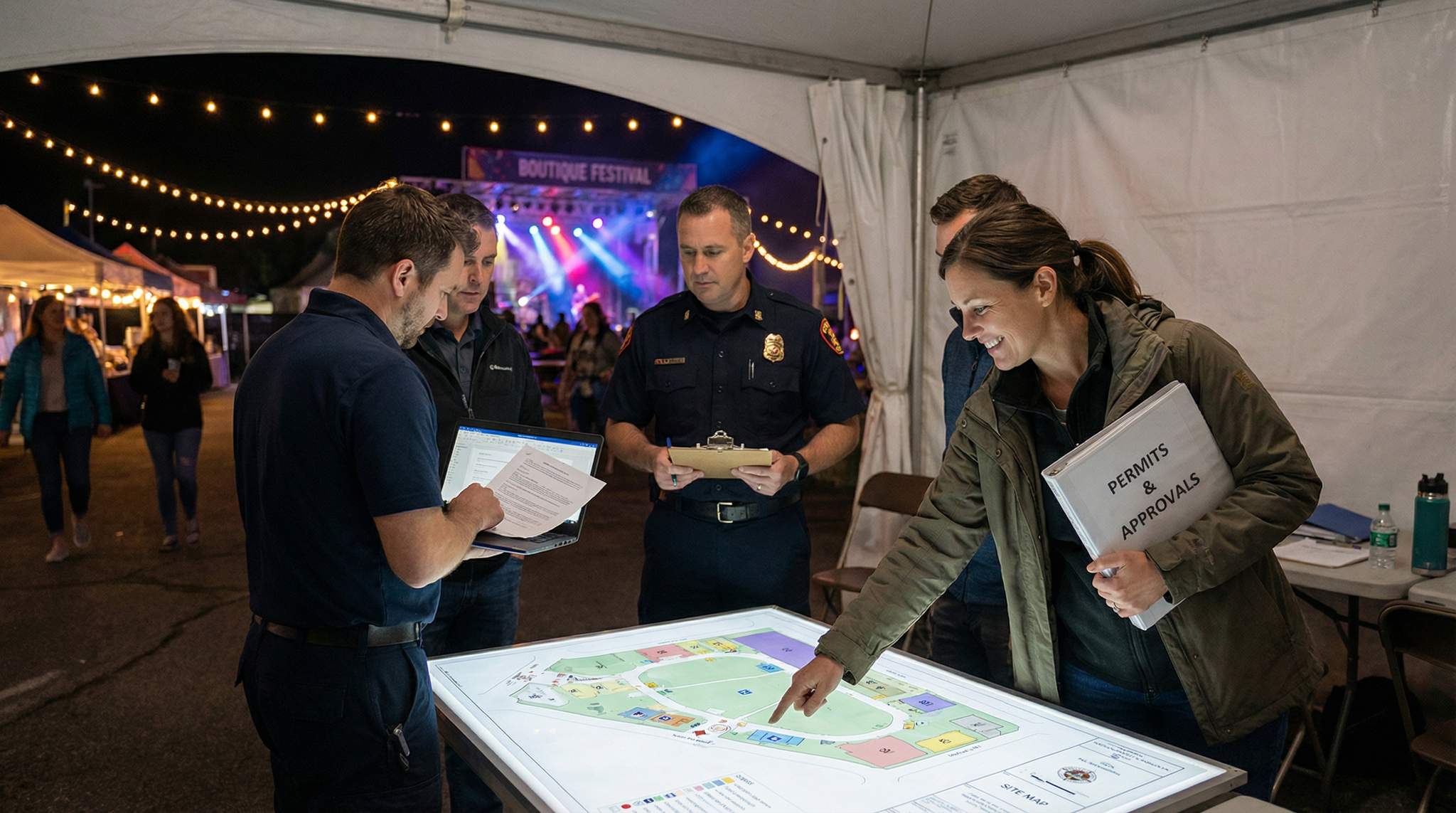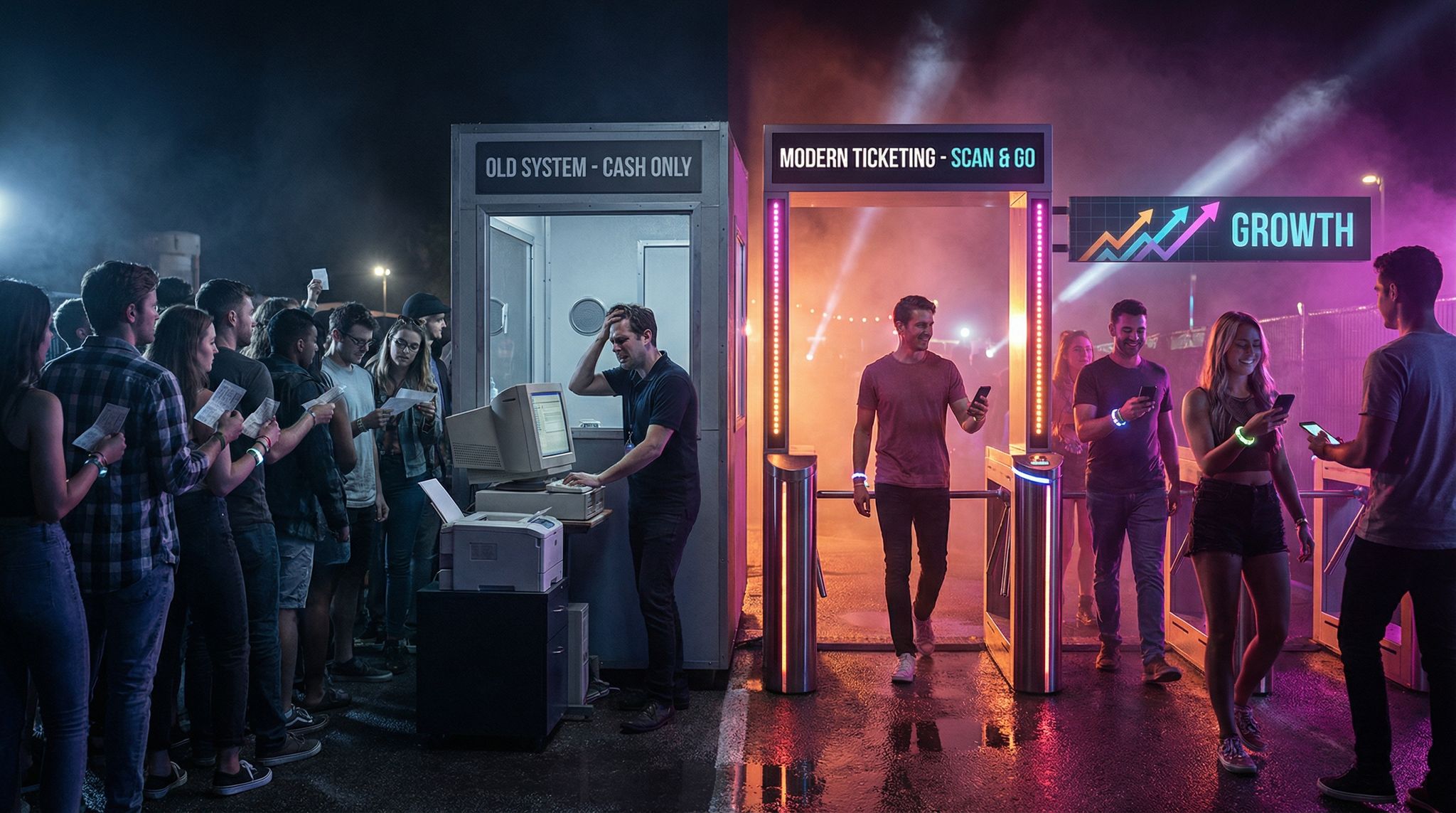Securing permits for a boutique festival can feel like navigating a bureaucratic maze. Yet even the most experienced festival organisers know that paperwork doesn’t have to provoke panic. With the right approach, approvals become part of the festival’s success story rather than a hurdle. This article shares hard-earned wisdom on giving your permits a little “personality” – transforming dry processes into opportunities for collaboration, community goodwill, and smooth sailing on event day.
Map Every Approval Early
Early planning is the antidote to last-minute permit chaos. Successful small-festival teams start by mapping out every approval they’ll need as soon as the venue and event concept are set. This means identifying all relevant permits and licences – noise variances, temporary structure/building permits, food vending permits, alcohol licences, health and safety certifications, and more – well ahead of time. For example, in many cities a noise permit is mandatory if your event’s sound will exceed the standard allowable decibel limits (often around 65–75 dB) or run late into the evening, a common restriction detailed in resources regarding noise limits by city for hosting events. Most communities impose “quiet hours” (typically after 10:00 PM) where decibel limits drop even for entertainment zones. If your boutique festival features amplified music that might push those limits, you’ll need to file for a noise variance or permit from the local authorities long before showtime. Failing to secure a noise permit can risk fines or a last-minute shutdown – not a pleasant surprise on the night of your event.
Temporary structures are another approval area that catches many first-timers off guard. Even at a small festival, you might be erecting stages, lighting rigs, or large tents – all of which can require building permits or fire safety inspections. As a rule of thumb, in the U.S. any tent over about 400 square feet (roughly a 20? x 20? size) typically triggers the need for a special tent permit, which is the general rule regarding the maximum tent size allowed without a permit (regulations vary by location, but 400 sq ft is a common threshold). Similarly, stage platforms above a certain height or capacity may need sign-off from a structural engineer or a temporary building permit from the city. Wise festival organisers will consult local building codes and fire department guidelines in the planning phase, rather than discovering requirements at the last minute.
Don’t forget food and alcohol permits. If you plan to have food vendors or stalls, health department permits and food-handling certifications are usually required. Small festivals have been caught out by inspectors shutting down food booths that lacked proper permits – a fiasco that’s entirely avoidable with early paperwork. Check if each food vendor needs their own permit or if you, as the event organiser, must obtain an overarching event health permit. Alcohol service introduces another layer: you often need a temporary event liquor licence or to partner with a duly licensed vendor. For instance, in the UK a festival serving alcohol must obtain a Temporary Event Notice (TEN) or premises licence in advance, as required by local licensing laws. In many U.S. states, nonprofits can apply for single-day liquor permits to cover beer or wine gardens; if that’s the route, start the application early and ensure all responsible service rules are met. If your festival is in a country like India, be aware that laws can differ by state – e.g. an event in Goa versus Mumbai will have different alcohol licensing processes. The key is to research every category of permit needed for your location and festival type, and map them on a timeline. Mark deadlines on a calendar (many jurisdictions need applications submitted weeks or months out). This upfront permit mapping might feel tedious, but it prevents the sheer panic of discovering a missing approval days before opening.
Turn Fans Into Your Marketing Team
Ticket Fairy's built-in referral rewards system incentivizes attendees to share your event, delivering 15-25% sales boosts and 30x ROI vs paid ads.
Build Relationships with Inspectors and Neighbours
A secret weapon of veteran festival organisers is building personal relationships with regulators, inspectors, and the local community. A small festival can’t afford adversarial permitting – you need allies, not just approvers.
Host Pre-Event Walkthroughs with Inspectors
One way to humanize the process is by hosting pre-event “walkthroughs” or meetings on-site with inspectors well before the festival. Rather than waiting for the official inspection on opening day with fingers crossed, invite the fire marshal, building inspector, or health officer to tour your venue during setup (or even during planning stages). Use this pre-walk to ask for their input and clarify how you can meet their success criteria. For example, the organisers of a boutique art festival in Melbourne scheduled a walkthrough with the city’s fire safety officials a month prior to opening. During this informal preview, the fire officers pointed out a few exit signage and fire extinguisher placement issues. The festival team then had ample time to make corrections – avoiding a potential last-minute compliance scramble. Inspectors appreciate this proactive approach; it shows professionalism and willingness to cooperate. It’s much easier to address concerns calmly in advance than under urgent deadlines, and it turns inspectors into mentors who help you improve safety.
Planning a Festival?
Ticket Fairy's festival ticketing platform handles multi-day passes, RFID wristbands, and complex festival operations.
Turn Neighbours into Allies
Don’t overlook community engagement in your permit strategy. Local residents and businesses can heavily influence whether your event gets approvals (or whether authorities impose extra restrictions). Smart boutique festival producers treat neighbours like partners. Consider holding a small community meeting or meet-and-greet weeks before the festival, especially if this is a new event in the area or if past editions had complaints. Explain your event plans, including how you’ll manage noise, traffic, and crowds. Even better, invite key community members (neighbourhood association leaders, nearby residents, shop owners) to a pre-event site walk. Show them where speakers will point (perhaps away from homes) and where attendees will park. Solicit their concerns and take notes – this feedback is gold for refining your plans.
For instance, the team behind a small electronic music festival in Colorado learned at a neighbour meetup that local farmers were worried about festival-goers trespassing on their land. The organisers responded by increasing fence signage and hiring extra security to patrol the perimeter, directly addressing those concerns. The result? Not only were permits granted without hiccup, but many skeptical neighbours became supportive after seeing the festival’s good-faith efforts. In some cases, community engagement can even be the deciding factor for authorities. Local councils or city permit boards often hold public hearings for event licences – having neighbours stand up in support of your festival (instead of opposition) can be a permit-winning factor.
Give credit where it’s due: many festivals around the world have excelled at community engagement. Glastonbury Festival in the UK, despite its massive size, invests heavily in its local community – donating to area charities and communicating transparently – which helps maintain local council support for its operations. On a smaller scale, Truck Festival (a boutique indie music festival in Oxfordshire, UK) has from its early days involved the local village by raising funds for community causes and inviting residents, turning would-be noisemakers into event ambassadors. These examples highlight that engaging your festival’s neighbours isn’t just a nice gesture, but a tactical move to smooth the path for approvals. When the people living nearby feel respected and included, they’re far less likely to lodge noise complaints or last-minute legal challenges that could derail your hard-won permits.
Track Corrections and Commitments in One Place
Permitting for events often comes with homework: inspectors may give you a list of corrections or conditions to meet before they sign off. To handle this professionally, keep all permit-related documentation organized in one binder (or a digital folder) that acts as your compliance bible. Whenever an official raises an issue – be it a fire exit that needs clearing, an extra hand-wash station for food prep, or a stage railing that must be reinforced – log it in this master binder. Note the date, what needs fixing, and the deadline. Then, once you address it, document the proof: take photos of the corrected setup (with timestamps), save receipts or certificates for any equipment added (like that new fire extinguisher), and even jot down the names of the inspectors or officers who recommended the change.
By tracking each correction with dates and photos, you create a clear paper trail that shows regulators you’ve complied with every requirement. This can be a lifesaver if there’s any dispute later – you can literally flip open your binder (or pull up a folder) and show the fire marshal the photo of the now-unblocked exit taken two weeks prior, for example. It also helps the festival team stay on top of tasks; nothing falls through the cracks when it’s all in one checklist. In practice, festival organisers have found that an organized permit binder not only impresses officials during inspections but also speeds up the approval process. Imagine an inspector asking, “Did you resolve the electrical issue we noted?” – you can confidently show the updated schematic or a contractor’s certificate from your binder without scrambling. This level of organisation is particularly vital for boutique festivals, where teams are often small and multitasking. You might not have a dedicated compliance department, but a single well-kept binder serves the same role.
Additionally, keep copies of all application forms, permits issued, and correspondence with agencies in this binder. Treat it as the festival’s temporary law book. If a question arises like “Who approved this road closure and when?”, you can find the signed permit letter in seconds. For outdoor events, some experienced festival producers even post key permit documents on-site at control centres or backstage (as required in certain jurisdictions) so that any official visiting can see you have your papers in order. During the event, continue tracking any incidents or inspector feedback in the binder – it will become a reference for your post-event debrief and next year’s planning. Over time, this practice builds your institutional memory of permit compliance. When you return for the next edition of the festival, that binder’s notes on what the health inspector flagged or how long the fire department took to approve your tent last time will prove invaluable.
Need Festival Funding?
Get the capital you need to book headliners, secure venues, and scale your festival production.
Invite Officials to Dress Rehearsals
When possible, take the extra step of inviting officials to your event’s dress rehearsal or test run. This might be a full run-through (if your festival has one), an on-site production test, or simply the final setup day before the public arrives. The idea is to let regulators see the festival in action, but without the pressure of the crowd, so they can gain confidence in your operations. Many small festivals run a sound check or lighting test the evening before opening – consider inviting the noise control officer or local police representative to observe. Not only does this show openness, it allows you to demonstrate compliance with permit conditions in a real-world scenario. For example, if you received a noise permit on the condition of keeping sound under a certain decibel level, a dress rehearsal is the perfect time to prove your systems meet that requirement. You could literally hand the officer a decibel meter reading during the soundcheck, confirming you’re within limits. Seeing is believing, and it’s far better for an official to verify everything is under control in a calm trial run than in the heat of the event.
This approach also fosters goodwill and trust. Invite the fire marshal to your production rehearsal where you test all special effects and generator power – let them walk around and even run an evacuation drill with your team. If you’ve promised in your permit application that all staff would be briefed on emergency procedures, show that briefing happening. By including officials in these pre-event activities, you position them as collaborators ensuring a safe festival, rather than adversaries waiting to find problems. In some cases, officials might even give you helpful tips during the rehearsal that prevent issues. An electrical inspector might catch an overloaded circuit during a test and advise a fix on the spot, rather than dealing with a power outage on show day. Or a health inspector observing your food court setup might suggest a better sanitizer placement – guidance you can implement before gates open. Festivals in countries like Japan have a practice of “preview nights” where local authorities and press are invited to experience the event setup; this kind of transparency can drastically reduce regulatory nerves for novel event concepts or first-time festivals. Even for more familiar events, inviting officials for a walkthrough at dress rehearsal signals respect and thoroughness. It demonstrates that the festival organiser is not trying to hide anything and values expert oversight.
Finally, consider also inviting community stakeholders – such as a local neighbourhood representative or venue landlord – to the pre-opening run-through. Letting them see the finished venue, hear the (controlled) sound, and observe security measures can turn any remaining skeptics into believers. By the time the real opening day arrives, both officials and neighbours will feel more at ease, having already seen that your team can deliver on your permit promises.
Paperwork as Diplomacy in Print
Throughout the permit process, remember that every document you submit is a piece of diplomacy in print. How you fill out forms, the thoroughness of your event plans, and even the tone of your emails or cover letters to officials all shape the regulators’ perception of your festival. Seasoned festival organisers treat permit applications not as annoying bureaucracy but as an opportunity to tell the event’s story and showcase professionalism. Rather than begrudgingly tossing in minimal details, take the time to craft clear, concise, and complete applications. Attach a thoughtful cover letter if appropriate – one that briefly introduces your festival (its purpose and positive community impact) and expresses appreciation for the authorities’ guidance. This sets a collaborative tone from the outset.
Be meticulous and truthful in all paperwork. Double-check that your site maps, crowd estimates, insurance documents, and safety plans align with what officials require. Incomplete or sloppy paperwork can delay approvals or raise red flags. A notorious cautionary tale is Woodstock 50 in 2019 – the revival attempt of the famous festival. Its permit application to an upstate New York town was denied for being submitted too late and missing key details, contributing to the event’s ultimate collapse. Similarly, the infamous Fyre Festival failed in part because organisers bypassed standard permitting and basic logistics; it remains a textbook example of how not to handle event compliance, as highlighted in reports discussing Fyre Festival as a cautionary tale. These failures underscore that submitting polished documentation isn’t just a red-tape nicety – it’s fundamental to proving your festival is well-managed and safe.
Diplomacy in paperwork also means demonstrating empathy and responsiveness. If an official raises concerns about, say, noise or parking in your permit review, respond with a written plan for mitigation right in your application or in follow-up correspondence. For example, you might include a brief section in your event management plan detailing a noise management strategy: “We will cap amplified sound at 70 dB at the property line after 9 PM, and our audio tech will monitor levels in real-time with a decibel meter. We have also communicated these limits to all performers to ensure compliance.” By proactively addressing likely concerns in writing, you reduce the back-and-forth with agencies. It shows you’ve done your homework and care about the same objectives they do (safety, public order, etc.).
Once permits are granted, continue the diplomacy. Abide by every condition outlined in your permits – they are essentially promises. If your liquor licence stipulates no alcohol service after 10 PM or your park permit requires cleaning the venue within 24 hours, make sure to honour those commitments. It’s wise to designate a “compliance captain” on your team during the event to ensure all permit conditions are being followed on the ground. After the festival, consider sending a thank-you note or email to the key officials you dealt with – thanking the parks department for their support, or the fire chief for working with you. This isn’t just polite; it solidifies a positive relationship, which can be very handy when you plan next year’s edition. In essence, treat every permit document as a handshake in writing – a chance to build trust. Over time, a reputation for responsible paperwork and honest communication will mark you as a reliable festival organiser in the eyes of authorities worldwide.
Frequently Asked Questions
When should organizers apply for festival permits?
Festival organizers must map out every required approval and submit applications 1 to 3 months before the event date. Early planning prevents last-minute panic and allows time to address specific requirements for noise variances, temporary structures, and health certifications. Deadlines vary by jurisdiction, so creating a timeline immediately after securing a venue is critical.
What are standard noise limits for outdoor festivals?
Most cities enforce noise limits between 65 and 75 decibels for outdoor events, with stricter quiet hours typically beginning after 10:00 PM. Festivals featuring amplified music often require a noise variance permit to exceed these standard levels. Organizers should monitor sound levels using decibel meters to ensure compliance with local ordinances.
What size tent requires a permit for events?
In the United States, a special tent permit is generally required for any temporary structure exceeding 400 square feet, such as a 20-by-20-foot tent. Regulations vary by location, but this size threshold typically triggers mandatory fire safety inspections and building code compliance checks to ensure structural integrity and safe egress for attendees.
How can festival organizers prevent noise complaints from neighbors?
Engaging the local community early through town hall meetings or meet-and-greets effectively reduces complaints. Organizers should explain noise management plans, traffic logistics, and crowd control measures directly to residents. Inviting key community members to pre-event site walks or dress rehearsals demonstrates transparency and turns potential opponents into supportive allies.
What is the best way to organize event permit documentation?
Maintaining a centralized master binder or digital folder is the most effective method for tracking compliance. This system should house all application forms, issued permits, and a log of inspector-requested corrections. Documenting fixes with timestamps and photos creates a clear paper trail, proving to officials that all safety conditions and requirements have been met.
Why should event organizers host pre-event walkthroughs with inspectors?
Hosting walkthroughs with fire marshals and health inspectors during the setup phase allows organizers to identify and fix compliance issues before opening day. This proactive approach transforms inspectors into collaborators, prevents last-minute shutdowns, and demonstrates professional commitment to safety. It ensures exit signage, fire extinguishers, and electrical setups meet all success criteria.
How do boutique festivals secure alcohol licenses?
Festivals typically secure alcohol approvals by applying for a temporary event liquor license or partnering with a pre-licensed vendor. In the UK, this involves obtaining a Temporary Event Notice (TEN), while U.S. nonprofits often utilize single-day permits for beer gardens. Applications must be submitted weeks in advance to satisfy local liability and responsible service laws.
What are common reasons festival permits get denied?
Permit denials frequently result from submitting incomplete applications, missing critical deadlines, or failing to provide detailed safety and logistics plans. Inaccurate site maps or insufficient insurance documentation also raise red flags with authorities. Submitting polished, truthful, and comprehensive paperwork is essential to prove the event is well-managed and safe for the public.





